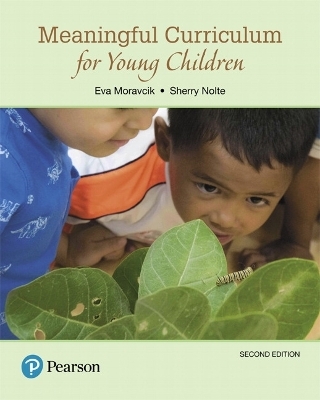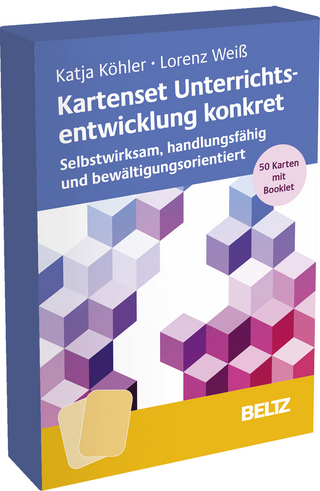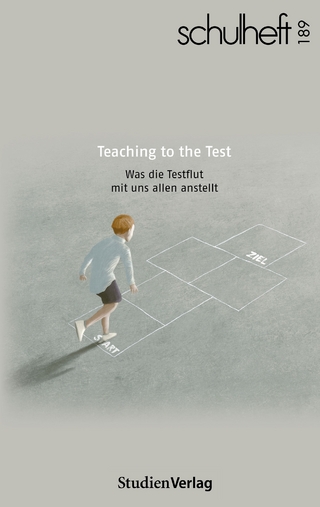
Meaningful Curriculum for Young Children, with Enhanced Pearson eText -- Access Card Package
Pearson
978-0-13-447942-2 (ISBN)
This package includes the Enhanced Pearson eText and the print bound version.
Comprehensive, practical, and engaging–a joyful, child-centered book designed to help students understand the content and processes involved in curriculum for young children.
This child-centered approach to understanding and planning curriculum focuses on humanistic and progressive education pedagogy in preschool and primary grades. The authors stress a curriculum that is joyful, has meaning to children, is built upon children’s strengths, has intellectual integrity, uses developmentally appropriate pedagogy, and encourages teachers to be passionate learners along with children. The book’s personal tone, many practical examples, step-by-step lesson planning process, and children’s art and photographs of children bring the content to life. The new edition features updating throughout, a number of new features that add to the understanding and usefulness of the concepts, new sections on teaching curriculum to two-year-olds, and a new connection to current national subject area standards throughout.
Invigorate learning with the Enhanced Pearson eText
The Enhanced Pearson eText provides a rich, interactive learning environment designed to improve student mastery of content and practice applying content with embedded videos and self-assessment quizzes. The Enhanced Pearson eText is also available without a print version of the textbook.
Instructors, visit pearsonhighered.com/etextbooks/ted to register for your digital examination copy. Students, register for or purchase your eText at pearsonhighered.com/etextbooks/ted.
Eva Moravcik, is Professor of Early Childhood Education at Honolulu Community College and is coordinator of the Leeward Community College Children’s Center. Her publications include Who Am I in the Lives of Children? 10th Edition Pearson 2015, and Teaching the Code of Ethical Conduct: A Resource Guide 2nd Edition, NAEYC 2016. Sherry Nolte, is recently retired as Professor of Early Childhood Education at Honolulu Community College. Her publications include Who Am I in the Lives of Children? 10th Edition Pearson 2015.
Brief Table of Contents
Chapter 1: Curriculum that Engages
Chapter 2: Planning, Implementing, and Assessing Curriculum
Chapter 3: Integrated Curriculum
Chapter 4: Large Motor Curriculum
Chapter 5: Fine Motor Curriculum
Chapter 6: Sensory Development Curriculum
Chapter 7: Language Curriculum
Chapter 8: Literacy Curriculum
Chapter 9: Literature Curriculum
Chapter 10: Art Curriculum
Chapter 11: Music Curriculum
Chapter 12: Creative Movement Curriculum
Chapter 13: Math Curriculum
Chapter 14: Science Curriculum
Chapter 15: Social Studies Curriculum
Detailed Table of Contents
Chapter 1: Curriculum that Engages
What is Curriculum?
Sources of Early Childhood Curriculum
What Teachers Need to Know to Plan Early Childhood Curriculum
How Early Childhood Curriculum is Organized
The Process of Designing Curriculum
Chapter 2: Planning, Implementing, and Assessing Curriculum
Why do Teachers Plan?
Before You Plan
Writing an Activity/Lesson Plan
Writing Plans in the Real World
Chapter 3: Integrated Curriculum
Why Integrated Curriculum?
Models of Integrated Curriculum
Designing an Integrated Curriculum Study
Chapter 4: Large Motor Curriculum
Why Large Motor Curriculum?
Understanding Large Motor Development
What is Large Motor Curriculum in Early Childhood?
Teaching the Large Motor Curriculum
Large Motor Curriculum for All Children
Chapter 5: Fine Motor Curriculum
Why Fine Motor Curriculum?
What is Fine Motor Curriculum in Early Childhood?
Planning Fine Motor Curriculum
Fine Motor Curriculum for All Children
Chapter 6: Sensory Development Curriculum
Why Sensory Development Curriculum?
Understanding Sensory Development
What is Sensory Curriculum in Early Childhood?
Teaching Sensory Curriculum
Planning Sensory Curriculum
Sensory Curriculum for All Children
Chapter 7: Language Curriculum
Why Language?
Understanding Language Development
What is Language Curriculum in Early Childhood?
Planning Language Curriculum
Language for All Children
Chapter 8: Literacy Curriculum
Why Literacy in Early Childhood?
Understanding Literacy Development
What is Literacy Curriculum in Early Childhood Education?
Teaching Literacy
Planning Literacy Curriculum
Literacy for All Children
Chapter 9: Literature Curriculum
Why Literature?
Literature and Development
What is Literature Curriculum in Early Childhood Education?
Teaching Literature
Planning Literature Curriculum
Literature for All Children
Chapter 10: Art Curriculum
Why Art Curriculum?
Understanding Artistic Development
What is Art Curriculum in Early Childhood Education?
Teaching Art
Planning Art Curriculum
Art for All Children
Chapter 11: Music Curriculum
Why Music?
Development and Music
What is Music Curriculum in Early Childhood?
Teaching Music
Planning Music Curriculum
Music for All Children
Chapter 12: Creative Movement Curriculum
Why Creative Movement?
Development and Creative Movement
What is Creative Movement Curriculum in Early Childhood?
Teaching Creative Movement
Planning Music Curriculum
Creative Movement for All Children
Chapter 13: Math Curriculum
Why Math?
Understanding Math Development
What is Math Curriculum in Early Childhood?
Teaching Math
Planning Math Curriculum
Math for All Children
Chapter 14: Science Curriculum
Why Science?
Development and Science
What is Science Curriculum in Early Childhood?
Teaching Science
Planning Science Curriculum
Science for All Children
Chapter 15: Social Studies Curriculum
Why Social Studies?
Understanding Development and Social Studies
What is Social Studies Curriculum in Early Childhood?
Teaching Social Studies
Planning Social Studies Curriculum
Social Studies for All Children
| Erscheint lt. Verlag | 21.1.2017 |
|---|---|
| Sprache | englisch |
| Maße | 205 x 255 mm |
| Gewicht | 1052 g |
| Themenwelt | Sozialwissenschaften ► Pädagogik ► Bildungstheorie |
| Sozialwissenschaften ► Pädagogik ► Schulpädagogik / Grundschule | |
| ISBN-10 | 0-13-447942-4 / 0134479424 |
| ISBN-13 | 978-0-13-447942-2 / 9780134479422 |
| Zustand | Neuware |
| Haben Sie eine Frage zum Produkt? |
aus dem Bereich


